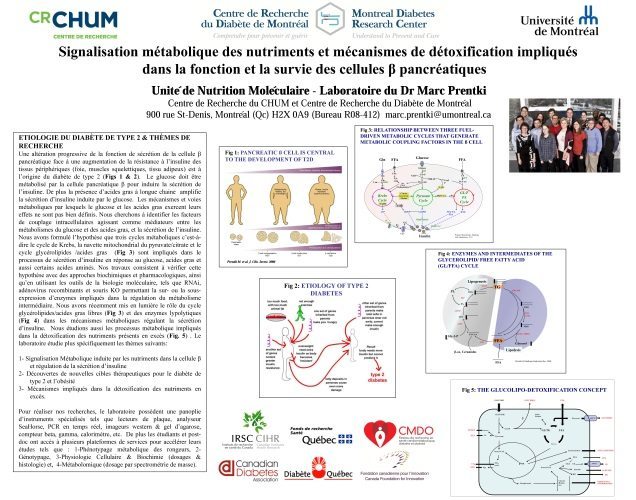Lab of the month – Prentki
Lab of the Month
Each month, we highlight a MDRC laboratory and its people to better understand their researches and to get know them better. The laboratory of Dr Prentki at the CRCHUM is featured this month.
Themes
• Regulation of insulin secretion and metabolic transduction system of the pancreatic β-cell
• Molecular basis of β-cell failure in type 2 diabetes
• Role of adipose tissue in energy homeostasis, obesity and diabetes
• Detoxification systems of excess nutrients
• New biomarkers and therapeutic targets for diabetes, obesity and metabolic syndrome
Metabolic signal transduction in pancreatic β-cell and regulation of insulin secretion
Glucose must be metabolised by the pancreatic β cell to induce insulin secretion. The mechanism by which glucose exerts this effect is not well defined. We seek to identify intracellular coupling factors acting as mediators between glucose metabolism and insulin secretion. We hypothesized that three metabolic cycles (the Krebs cycle, pyruvate cycle and glycerolipids cycle/ fatty acids) are involved in the process of insulin secretion in response to glucose, fatty acids and certain amino acids. Our job is to test this hypothesis with biochemical and molecular biology approaches, such as RNAi, recombinant adenoviruses and KO mice, to over- or under-express of enzymes involved in the regulation of intermediary metabolism. We also wish to identify genetic and nutritional deficiencies causing defective insulin secretion in type 2 diabetes.
Etiology of Type 2 diabetes
A progressive deterioration of β cell in the presence of insulin resistance is at the root of type 2 diabetes . Our laboratory uses various animal models as well as β cells and Langerhans islet in culture to understand the mechanisms by which β-cell function is altered and what are the phenomena that cause apoptosis of these cells. We study in particular glucolipotoxicity in vitro and in vivo as well as the process of detoxification of excess nutrients.
New therapeutic targets for obesity and diabetes
We have identified new enzymes involved in the control of adiposity, energy metabolism and detoxification of excess nutrients. Our laboratory has patented these therapeutic targets. First, we study the mechanisms by which these targets work and secondly we are developing new inhibitor compounds in collaboration with industry.



